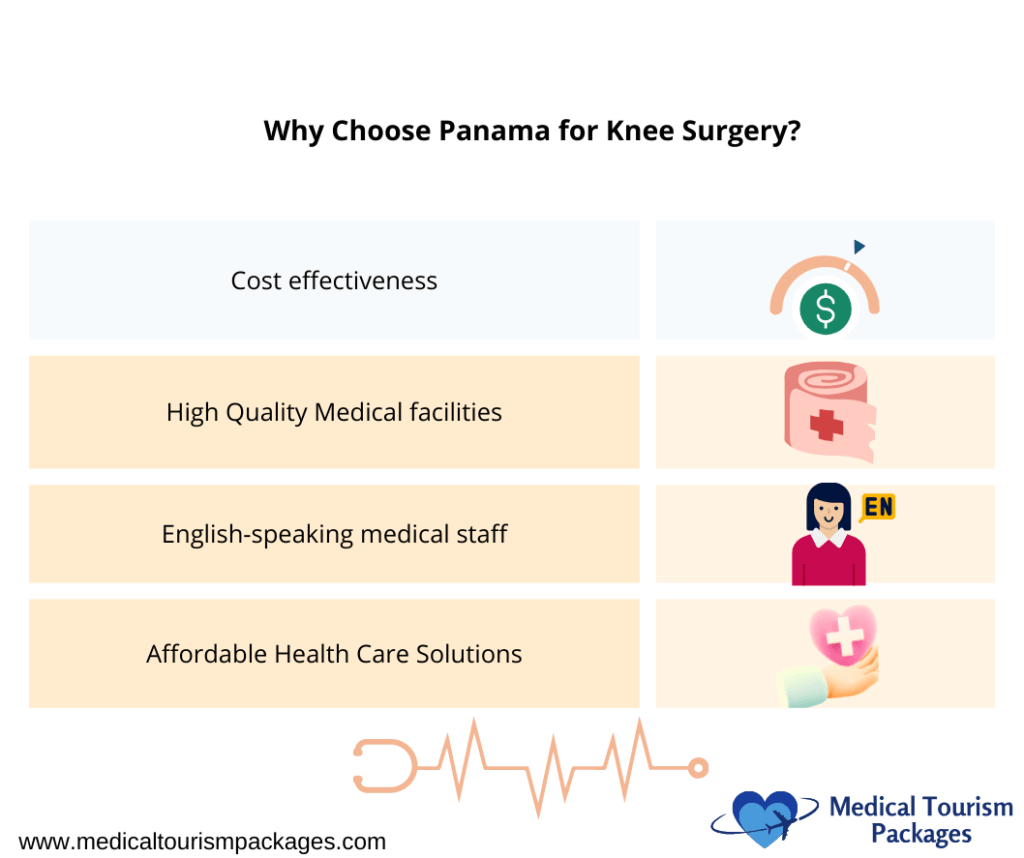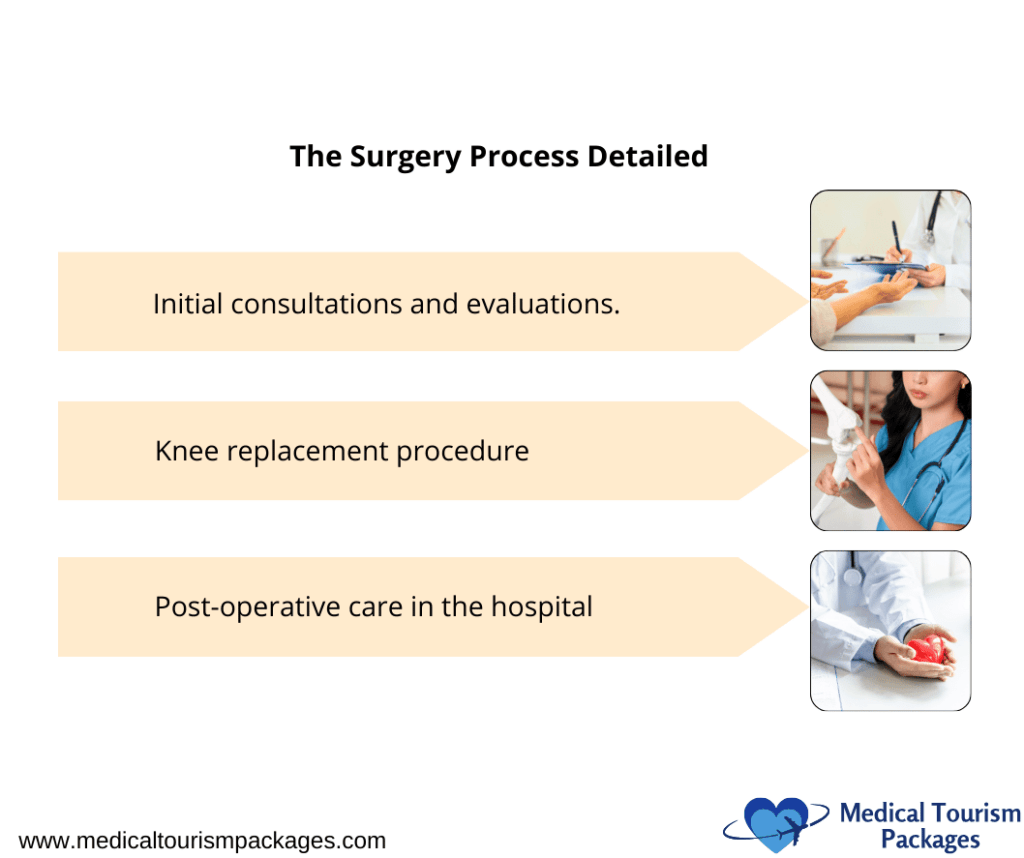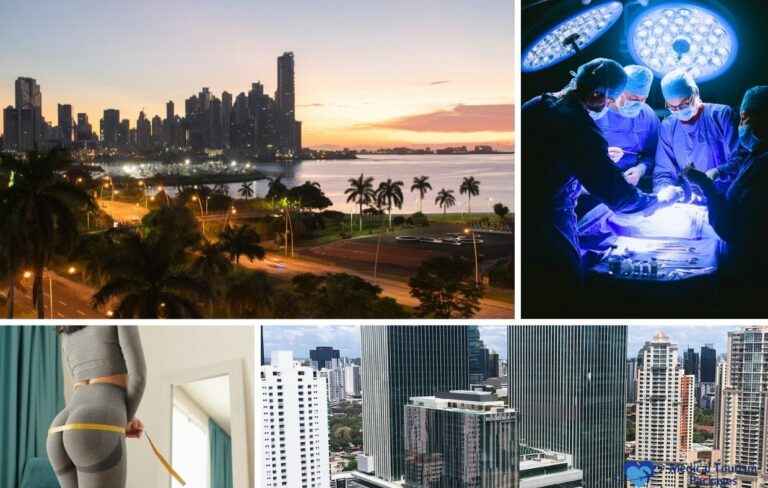Book Appointment Now

Knee Replacement in Panama: Your Patient Guide
Considering knee replacement surgery can be a daunting prospect, but for those suffering from severe knee pain and mobility issues, it could be a game-changer. And if you’re looking for an affordable, high-quality option, Panama might just be the destination for you. This Central American country is becoming increasingly popular among medical tourists, thanks to its cost-effective healthcare, state-of-the-art medical facilities, and English-speaking medical staff.
Whether you’re battling arthritis or recovering from an injury, knee replacement surgery in Panama offers a promising path to pain relief and improved quality of life. In this guide, we’ll explore everything you need to know about undergoing knee replacement in Panama, from understanding the surgery and selecting the right hospital to navigating post-surgery rehabilitation and legal considerations for international patients. Join us as we delve into the world of knee replacement in Panama, and discover how this procedure could help you reclaim your mobility and enjoy life to the fullest.
What is Knee Replacement Surgery?
Knee replacement surgery, also known as knee arthroplasty, is a procedure aimed at relieving pain and restoring function in severely diseased knee joints. This surgical intervention involves cutting away damaged bone and cartilage from the thighbone, shinbone, and kneecap, and replacing it with an artificial joint made of metal alloys, high-grade plastics, and polymers. The primary goal of knee replacement surgery is to alleviate pain and improve the quality of life for individuals with severe knee problems, often resulting from arthritis or other joint diseases.
By replacing the damaged parts of the knee with artificial components, the surgery seeks to offer patients the ability to return to normal activities with less pain and improved joint function. This procedure is typically considered when other treatment options, such as medication, physical therapy, and the use of walking supports, have failed to provide relief. With advancements in surgical techniques and prosthetic design, knee replacement has become a highly successful intervention, significantly improving the lives of patients who undergo the operation.
Why Choose Panama for Knee Surgery?
Panama stands out as a premier destination for knee surgery due to its cost-effectiveness, high-quality medical facilities, and English-speaking medical staff. The country offers a significant cost advantage over the US, making it an attractive option for those seeking affordable healthcare solutions without compromising on quality. Panama’s medical facilities are equipped with state-of-the-art technology and adhere to international standards, ensuring patients receive top-notch care.
Panama has a large pool of medical professionals who are not only highly skilled in knee replacement procedures but also fluent in English. This eliminates language barriers, making the entire medical journey—from initial consultations to post-operative care—smoother and more comfortable for patients. Choosing Panama for knee surgery means benefiting from a blend of affordability, quality, and comfort, making it an ideal healthcare destination.

Cost-effectiveness Compared to the US
Panama offers cost-effective solutions for knee surgery, making high-quality healthcare accessible at a fraction of the cost found in the United States. Patients can save significantly on medical expenses without compromising the quality of care. This affordability is a key factor for many in choosing Panama for their medical needs, providing an opportunity to obtain essential healthcare services more economically.
| Expense Category | Average Cost in Panama | Average Cost in the US |
|---|---|---|
| Surgery Fees | $8,000 – $12,000 | $30,000 – $50,000 |
| Hospital Stay | $2,000 – $3,000 | $5,000 – $10,000 |
| Rehabilitation | $1,000 – $2,000 | $2,000 – $4,000 |
High-quality Medical Facilities
High-quality medical facilities in Panama are equipped with the latest in medical technology and adhere to international healthcare standards. These state-of-the-art hospitals and clinics ensure that patients receive the best possible care in a safe and modern environment. The commitment to maintaining global standards of healthcare makes Panama an attractive destination for those seeking top-tier medical treatment.
| Hospital Name | Accreditations |
|---|---|
| Punta Pacifica Hospital | JCI (Joint Commission International) |
| Hospital Nacional | Accredited by the Panamanian Health Ministry |
| Centro Médico Paitilla | JCI and ISO 9001:2000 |
English-speaking Medical Staff
The availability of English-speaking medical staff in Panama greatly enhances the overall patient experience. Effective communication is essential, especially in healthcare settings, and the ability to discuss treatment plans, surgical procedures, and post-operative care in English removes language barriers. This ensures clarity and understanding throughout the medical journey, fostering a sense of trust and comfort between patients and healthcare providers.
| Hospital/Clinic Name | English-speaking Staff Availability |
|---|---|
| Punta Pacifica Hospital | High |
| Hospital Nacional | Moderate |
| Centro Médico Paitilla | High |
Testimonials:
- “The staff at Punta Pacifica were not only professional but also incredibly fluent in English, making my surgery experience as smooth as possible.” – John D.
- “Having an English-speaking surgeon at Centro Médico Paitilla put my mind at ease during my knee replacement procedure.” – Emily R.
Selecting the Right Hospital
Choosing the right hospital for knee surgery in Panama involves evaluating several critical factors to ensure the highest standard of care. International accreditation standards are a primary indicator of quality, signifying a hospital’s adherence to rigorous healthcare practices. Patients should prioritize facilities that have earned recognition from reputable global healthcare accreditation bodies, as this reflects a commitment to medical excellence.
The surgeon’s expertise in knee replacement is equally crucial. It’s important for patients to conduct thorough research on potential surgeons, focusing on their professional qualifications, experience, and success rates with knee surgeries. Looking into the surgeon’s background and real patient feedback can provide valuable insights into their proficiency and patient care quality.
Real patient feedback offers a genuine perspective on the hospital’s care standards and the medical staff’s approach. Prospective patients are advised to seek out testimonials from those who have experienced knee surgery in Panama firsthand. This feedback can be instrumental in forming a realistic expectation and making a well-informed hospital selection.
International Accreditation Standards
Hospitals in Panama that are recognized by international accreditation bodies such as the Joint Commission International (JCI) or the International Organization for Standardization (ISO) demonstrate a commitment to high-quality healthcare standards. These accreditations indicate that a hospital has undergone a rigorous evaluation process and has met established criteria for patient safety and quality care.
Surgeon’s Expertise in Knee Replacement
Evaluating a surgeon’s expertise involves looking into their educational background, certifications, and memberships in professional organizations such as the American Academy of Orthopaedic Surgeons (AAOS). Patients should also consider the surgeon’s experience, specifically the number of knee replacement surgeries performed and the success rates of these procedures. Renowned surgeons in Panama often have profiles available online or can be inquired about through the hospital’s patient coordination services.
Real Patient Feedback
Platforms such as Healthgrades, Medigo, and RealSelf, along with social media groups and forums dedicated to medical tourism in Panama, can be valuable resources for gathering real patient feedback. These platforms allow prospective patients to read reviews, watch testimonial videos, and sometimes directly interact with past patients to gain insights into their experiences with knee replacement surgery in Panama.
Understanding the Costs
Navigating the financial aspects of knee surgery in Panama necessitates a comprehensive understanding of the costs involved. This includes a detailed breakdown of surgery expenses, which encompasses not only the surgical procedure itself but also pre-operative consultations and necessary post-operative care. When compared to the United States, Panama’s cost-effectiveness becomes evident, offering patients significant savings without sacrificing the quality of care.
Evaluating the comparison of accommodation costs is essential for those planning their stay in Panama during the surgery and recovery period. Affordable yet comfortable accommodation options contribute to the overall financial savings. Furthermore, physical therapy and rehabilitation expenses play a vital role in the recovery process and are an important consideration in the total cost.
Breakdown of Surgery Expenses
| Expense Category | Cost in Panama | Cost in the US |
|---|---|---|
| Surgeon’s Fees | $4,000 | $20,000 |
| Hospital Charges (3-day stay) | $2,500 | $15,000 |
| Anesthesia | $700 | $2,000 |
| Pre-surgery Medical Evaluation | $500 | $1,500 |
| Total Estimated Cost | $7,700 | $38,500 |
Comparison of Accommodation Costs
| Accommodation Type | Average Cost per Night in Panama | Average Cost per Night in the US |
|---|---|---|
| Budget Hotel | $50 | $100 |
| Mid-range Hotel | $75 | $200 |
| Luxury Hotel | $120 | $350 |
Physical Therapy and Rehabilitation Expenses
| Service Type | Cost in Panama | Cost in the US |
|---|---|---|
| In-hospital Rehabilitation | $1,000 | $4,000 |
| Outpatient Physical Therapy | $50/session | $150/session |
| Specialized Rehabilitation | $2,000 | $6,000 |
| Total Estimated Cost (1 Month) | $3,000 | $10,000 |
Pre-surgery Preparations
Pre-surgery preparations are essential for ensuring a seamless and effective procedure. This phase involves the collection and submission of required medical documents and tests, which are crucial for the surgical team to accurately assess the patient’s health status and customize the surgery plan accordingly. Patients will receive guidance on dietary and medication guidelines to follow in the days leading up to the surgery.
Adhering to these guidelines is vital for minimizing potential complications and optimizing the surgery’s success. Furthermore, arranging your stay and local transportation well in advance is recommended to ensure a worry-free experience. Securing accommodations close to the hospital and planning for mobility post-surgery can significantly contribute to a comfortable recovery phase.
Required Medical Documents and Tests
A comprehensive list of required medical documents and tests ensures the surgical team is well-informed about the patient’s health condition. This includes:
| Document/Test Type | Description | Purpose |
|---|---|---|
| Medical History | A detailed account of past and current medical conditions. | To provide the surgical team with a comprehensive understanding of the patient’s health background. |
| Blood Tests | Including CBC, blood typing, and clotting factors. | To assess overall health and identify any potential issues that could complicate surgery. |
| Imaging Studies | X-rays, MRI, or CT scans of the knee. | To evaluate the extent of knee damage and plan the surgical approach. |
| Cardiac Evaluation | ECG and, if necessary, a stress test. | To ensure the patient’s heart health is adequate for undergoing surgery. |
| Clearance Letters | From the patient’s primary care physician or specialists managing chronic conditions. | To confirm the patient’s suitability for knee replacement surgery. |
Dietary and Medication Guidelines
Dietary and medication guidelines are provided to optimize patient health before surgery and minimize risks:
- Dietary Restrictions: Patients may be advised to avoid certain foods and supplements that could affect blood clotting, such as vitamin E, garlic supplements, and green tea.
- Medication Adjustments: Anticoagulant medications (e.g., warfarin) may need to be paused or adjusted under medical supervision. Patients should also inform the surgical team about any over-the-counter medications or supplements they are taking.
Arranging Your Stay and Local Transportation
Efficiently arranging your stay and local transportation is crucial for a seamless medical journey in Panama. Recommended areas for accommodation and transportation services include:
| Accommodation Type | Recommended Areas | Transportation Services |
|---|---|---|
| Hotels | Near major hospitals in Panama City, such as Punta Pacifica or El Cangrejo. | Shuttle services from the hotel, taxi, or ride-sharing apps like Uber. |
| Apartments | Serviced apartments in central locations offer more space and amenities. | Rental car services with English-speaking drivers, if preferred for more independence. |
| Recovery Houses | Specialized accommodations offering post-surgery care and meals. | Often include transport to medical appointments and airport transfers. |
The Surgery Process Detailed
The journey through knee surgery in Panama unfolds through a series of well-structured steps, beginning with initial consultations and evaluations. This initial phase is crucial, as it allows patients to engage with their surgical team, understand the specifics of the procedure, and undergo a thorough evaluation of their knee’s condition. It sets the stage for a well-informed and prepared patient, ready to proceed with confidence.

Next, the steps of the knee replacement procedure are carefully planned and carried out. The surgery involves the precise removal of damaged bone and cartilage from the knee, which is then replaced with high-quality artificial components. This stage utilizes the latest in surgical techniques to ensure accuracy and the best outcomes for the patient.
The post-operative phase, post-operative care in the hospital, is vital for a successful recovery. During this time, patients receive dedicated care, including pain management, wound care, and the initiation of the rehabilitation process. This care is provided under the vigilant supervision of the medical team, ensuring a supportive environment for the patient’s recovery.
Initial Consultations and Evaluations
The journey towards knee surgery begins with initial consultations and evaluations. During this vital stage, patients meet with their surgical team to discuss the objectives, risks, and anticipated outcomes of the procedure. A series of comprehensive diagnostic tests, such as imaging scans and blood tests, are conducted to evaluate the severity of the knee damage.
Steps of the Knee Replacement Procedure
The steps of the knee replacement procedure are carried out with meticulous attention to detail. The procedure starts with administering anesthesia to ensure patient comfort, followed by the precise removal of the damaged portions of the knee joint. The surgeon then implants the artificial components, crafted from durable materials like metal and plastic, to reconstruct the knee joint.
This surgical process is designed to alleviate pain and enhance mobility, with each action carefully planned to maximize patient safety and the effectiveness of the outcome.
Post-operative Care in the Hospital
Post-operative care in the hospital plays a crucial role in the recovery journey. In the immediate aftermath of the surgery, patients are closely monitored for potential complications, including signs of infection or blood clots. Effective pain management techniques are employed to manage discomfort, and physical therapy often commences the following day to support the rehabilitation of the knee joint.
Post-surgery Rehabilitation in Panama
After knee surgery, the journey towards full recovery continues with post-surgery rehabilitation, a critical phase aimed at ensuring the best possible outcomes. This process begins with in-hospital rehabilitation services, where patients engage in early mobilization and strengthening exercises under the expert guidance of rehabilitation professionals. The emphasis is on starting the recovery process promptly and effectively, laying the foundation for a successful recuperation.

As patients make progress, they transition to outpatient physical therapy options. Panama boasts a variety of high-quality rehabilitation services designed to cater to the unique needs of each patient. These programs focus on restoring knee functionality, enhancing flexibility, and minimizing the overall recovery period, ensuring patients can return to their daily activities as swiftly and safely as possible.
Moreover, patients receive tips for effective recovery at their accommodation, including exercises that can be performed independently and lifestyle modifications to aid in the healing process. This comprehensive approach to post-surgery rehabilitation in Panama not only fosters physical recovery but also equips patients with the knowledge and tools needed to sustain their knee health well into the future.
In-hospital Rehabilitation Services
In-hospital rehabilitation services are a cornerstone of the recovery process immediately following knee surgery. Patients have access to a dedicated team of rehabilitation experts who guide them through a series of exercises aimed at restoring knee mobility and strength. This crucial early intervention focuses on reducing pain and swelling, while incrementally improving joint functionality.
The personalized attention during in-hospital rehabilitation ensures that each patient’s recovery journey is off to a strong start, under the careful supervision of healthcare professionals.
Outpatient Physical Therapy Options
Transitioning to outpatient physical therapy options marks an important phase in the rehabilitation process. Panama’s healthcare system provides a diverse range of outpatient therapy services, each designed to cater to the individual rehabilitation needs of patients. These services aim to build upon the progress made during in-hospital rehab, with a focus on enhancing knee strength, flexibility, and overall mobility.
Tailored exercise programs and cutting-edge therapy techniques are employed to help patients regain their full range of motion, facilitating a return to normal activities with confidence.
| Outpatient Rehabilitation Center | Services Offered | Location |
|---|---|---|
| Panama Physical Therapy Clinic | Manual therapy, aquatic therapy, strength training | Panama City |
| Central Rehab Panama | Custom exercise programs, occupational therapy | Panama City |
| New Life Rehabilitation | Sports rehabilitation, post-surgical care | David |
| Pacific Coast Physiotherapy | Manual therapy, electrotherapy, ultrasound therapy | Coronado |
| HealthBridge Panama | Balance training, functional mobility, pain management | Boquete |
Tips for Effective Recovery at Your Accommodation
Recovery continues at home, and tips for effective recovery at your accommodation are essential for ensuring ongoing progress. Patients are equipped with knowledge on exercises that can be performed safely within their own space, emphasizing the importance of gentle stretching and strengthening exercises that promote knee health. Advice on lifestyle modifications, such as adopting a nutritious diet, ensuring adequate hydration, and avoiding undue stress on the knee, further supports the recovery process.
Legal Considerations for International Patients
For international patients planning knee surgery in Panama, navigating the legal considerations is a crucial step in ensuring a seamless medical journey. Key among these is understanding the process for obtaining a medical visa for Panama, necessary for those from countries without visa exemption agreements with Panama. This process requires gathering specific documentation and meeting the criteria established by Panamanian immigration authorities.
Equally important is gaining a thorough knowledge of Panama’s healthcare laws. This knowledge ensures that patients are aware of the standard of care they should expect and the legal options available to them in the rare case of medical malpractice. Understanding privacy and patient rights in Panama is also vital.
International patients must inform themselves about how their medical data will be handled, focusing on issues of patient confidentiality and the consent process for medical treatments. Being well-versed in these legal considerations not only facilitates a smooth preparation for medical travel but also safeguards the patient’s healthcare experience in Panama.
Obtaining a Medical Visa for Panama
| Step | Requirement | Description |
|---|---|---|
| 1 | Application Form | Complete the visa application form specific to medical treatment. |
| 2 | Passport | Valid passport with at least 6 months validity. |
| 3 | Medical Records | Comprehensive medical records detailing the need for treatment. |
| 4 | Financial Proof | Evidence of financial means to cover medical and living expenses during the stay. |
| 5 | Invitation Letter | An official letter from the healthcare facility in Panama confirming the appointment. |
| 6 | Visa Fee | Payment of the visa application fee as specified by the Panamanian consulate. |
Understanding Panama’s Healthcare Laws
Gaining a thorough understanding of Panama’s healthcare laws is essential for international patients. These laws establish the framework for the delivery of medical services, setting standards for the quality of care, patient safety, and the responsibilities of healthcare providers. Being informed about these regulations empowers patients to navigate the healthcare system confidently, ensuring they receive the high standard of care they are entitled to and know their options should they need to address any concerns about their treatment.
Privacy and Patient Rights
Privacy and patient rights are paramount for patients undergoing medical treatment in Panama. The country’s healthcare regulations safeguard the confidentiality of patient information and ensure the ethical handling of medical records. International patients should inquire about the healthcare facility’s policies regarding data protection and the sharing of medical information.
Understanding these policies is crucial for patients to feel secure in the knowledge that their privacy is protected and that they have control over their personal and medical information, thereby reinforcing the trust and integrity of the patient-healthcare provider relationship.
Planning Your Return
After completing knee replacement surgery in Panama, planning your return is a crucial step in the recovery process. This involves setting up a post-surgery check-up schedule to ensure your knee is healing properly before you travel back home. It’s also essential to follow guidelines for safe travel post-operation to avoid complications.
Once home, adjusting to life after knee replacement involves ongoing physical therapy, follow-up care, and lifestyle adjustments to support your recovery and enhance the success of your surgery.
Post-surgery Check-up Schedule
Before leaving Panama, a final check-up with your surgical team is important to assess your recovery and readiness for travel. This visit should confirm that the surgical site is healing well and that you have the necessary information for continued care at home. It’s advisable to arrange follow-up appointments with a local healthcare provider to monitor your progress and address any concerns that may arise during your recovery.
Guidelines for Safe Travel Post-operation
Traveling after knee surgery requires careful planning to ensure your comfort and safety. Recommendations include keeping the operated leg elevated as much as possible, staying hydrated, and taking short walks periodically during the journey to promote circulation. Wearing compression stockings and managing pain and swelling with medication are also key guidelines to follow.
Adhering to these travel tips helps minimize the risk of complications and ensures a more comfortable return journey.
Adjusting to Life after Knee Replacement
Life post-knee replacement surgery involves several adjustments to support your recovery and maximize the benefits of the procedure. Continuing with prescribed physical therapy exercises, making modifications to your home to prevent falls, and adhering to a healthy lifestyle are all crucial steps. Regular follow-up care with your healthcare provider is also essential to monitor your progress and address any issues promptly.
By taking these steps, you can enjoy a smoother recovery and a return to an active, fulfilling life.
Success Stories and Outcomes
The narrative of knee replacement surgery in Panama is rich with success stories and outcomes that highlight the procedure’s capacity to significantly enhance patients’ lives. Individuals from various corners of the world have reported dramatic improvements in their quality of life, characterized by diminished pain, increased mobility, and the ability to resume cherished activities. These accomplishments reflect the superior care, cutting-edge surgical methods, and all-encompassing rehabilitation services offered in Panama.
Personal testimonials and experiences shared by those who have undergone the procedure in Panama shine a light on the attentive and customized care provided by medical professionals. Many patients express gratitude for the surgery’s role in not only relieving their pain but also in reclaiming their autonomy and daily life activities free from discomfort. The long-term benefits of knee replacement stand as a testament to the procedure’s effectiveness, with many experiencing enduring pain relief and enhanced joint functionality.
Such outcomes underscore the profound impact of the surgery on patients’ overall quality of life, enabling them to lead more active and satisfying lives post-operation. These success narratives are a beacon of hope and motivation for individuals contemplating knee replacement, demonstrating the transformative potential of this medical intervention.
Patient Testimonials and Experiences
Patient testimonials and experiences with knee replacement surgery in Panama provide compelling narratives of transformation and hope. These stories, shared by individuals who have undergone the procedure, highlight not just the surgical success but also the empathetic and skilled care provided by Panama’s medical teams. Such testimonials are instrumental in offering prospective patients a genuine glimpse into what the journey entails—underscoring the profound impact of the surgery on individuals’ lives and serving as a source of inspiration and confidence for those contemplating the procedure.
Long-term Benefits of Knee Replacement
The long-term benefits of knee replacement surgery are profound, with countless patients enjoying a significant reduction in pain and a marked improvement in joint functionality. This positive outcome has a domino effect on various aspects of health, including mental and emotional well-being, as patients find themselves able to participate in beloved activities and hobbies once again. The durability of these benefits highlights the surgery’s role not only in enhancing mobility but also in significantly boosting patients’ overall quality of life and satisfaction, making it a pivotal solution for chronic knee issues.
Quality of Life Improvements Post-Surgery
Quality of life improvements post-surgery are consistently reported by patients who have received knee replacements in Panama. These individuals often describe experiencing a dramatic shift in their daily lives, from undertaking simple movements without pain to engaging in sports and activities that were previously impossible. Such enhancements are frequently characterized as life-altering, empowering patients to lead a more active, fulfilling life free from the constraints of knee pain.
The substantial improvements in daily functioning and overall happiness post-surgery underscore the transformative potential of knee replacement, affirming its significant value for individuals seeking relief from severe knee conditions.
Frequently Asked Questions
What is knee replacement surgery?
Knee replacement surgery, or knee arthroplasty, is a procedure designed to relieve pain and restore function in severely damaged knee joints. It involves replacing damaged bone and cartilage with artificial components made of metal alloys, high-grade plastics, and polymers. The surgery is recommended when other treatments, such as medication and physical therapy, no longer provide relief.
Why choose Panama for knee replacement surgery?
Panama offers high-quality knee replacement surgery at a fraction of the cost compared to the US. The country has state-of-the-art medical facilities, internationally accredited hospitals, and experienced surgeons. Additionally, many medical professionals speak English, ensuring smooth communication for international patients.
How much does knee replacement surgery cost in Panama?
The cost of knee replacement surgery in Panama typically ranges between $8,000 and $12,000. This price includes hospital fees, surgeon’s fees, and basic post-operative care. In contrast, the same procedure in the US can cost between $30,000 and $50,000, making Panama a more affordable option.
What is the recovery process like after knee surgery in Panama?
Recovery after knee replacement in Panama typically involves a short hospital stay of 2-3 days, followed by outpatient physical therapy. Most patients begin walking with assistance within a few days and can resume normal activities within 6-8 weeks. Full recovery may take up to six months, with ongoing physical therapy recommended for optimal results.
What legal considerations should international patients be aware of?
International patients should ensure they obtain a medical visa if required and confirm the hospital’s accreditation. Understanding Panama’s healthcare laws, patient rights, and privacy policies is also important. Hospitals in Panama follow international standards, but patients should review medical contracts and discuss legal recourse in case of malpractice.



